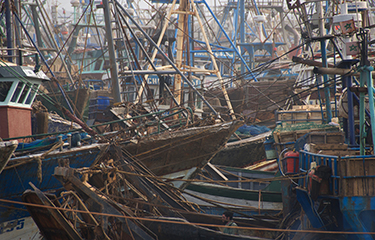The Food and Agriculture Organization of the United Nations has released the latest addition of the biannual “State of World Fisheries and Aquaculture” report, a flagship publication in the United Nations' “State of the World” series.
The 2020 edition of the publication is devoted to “Sustainability in Action” as the organization continues to focus on meeting Sustainable Development Goals established back in 2015. Comprised of 17 separate actionable goals, the current progress, according to the FAO, hasn’t been fast enough.
“After five years of uneven progress and with less than 10 years to go, and despite progress in many areas, it is clear that action to meet the 17 Sustainable Development Goals is not yet advancing at the speed or scale required,” the forward of the new report, written by FAO Director-General Qu Dongyu, states. “It is therefore necessary and timely that the 2020 edition of The State of World Fisheries and Aquaculture is devoted to the topic of Sustainability in Action.”
At its core, the FAO’s goal is to fight hunger and poverty. The report acts as a way for the organization to examine how fisheries and aquaculture factor in to the overall fight against food insecurity.
“The 2020 edition of The State of World Fisheries and Aquaculture continues to demonstrate the significant and growing role of fisheries and aquaculture in providing food, nutrition and employment,” Dongyu wrote. “It also shows the major challenges ahead despite the progress made on a number of fronts.”
Those challenges include improving the management of a number of fisheries across the globe, particularly fisheries that are overfished, in order to improve food security by having sustainable, predictable yields from fisheries.
Coupled with that goal is the recognition of aquaculture’s growing capacity for producing food.
“While capture fisheries will remain relevant, aquaculture has already demonstrated its crucial role in global food security, with its production growing at 7.5 percent per year since 1970,” Dongyu wrote. “Recognizing the capacity of aquaculture for further growth, but also the enormity of the environmental challenges the sector must face as it intensifies production, demands new sustainable aquaculture development strategies. Such strategies need to harness technical developments in, for example, feeds, genetic selection, biosecurity and disease control, and digital innovation, with business developments in investment and trade.”
The report also comes at a significant point in the FAO’s history: 2020 marks the 75th anniversary of its creation.
“It is also the 25th anniversary of the FAO Code of Conduct for Responsible Fisheries, the blueprint that has guided fisheries and aquaculture policy development around the world,” Dongyu wrote. “However, there is no time for celebrations. These anniversaries remind us of the reason for our existence, they are calls to action, springboards for change, for a rapidly changing world in need of innovative and transformative solutions to old as well as new problems.”
Photo courtesy of PeskyMonkey/Shutterstock







